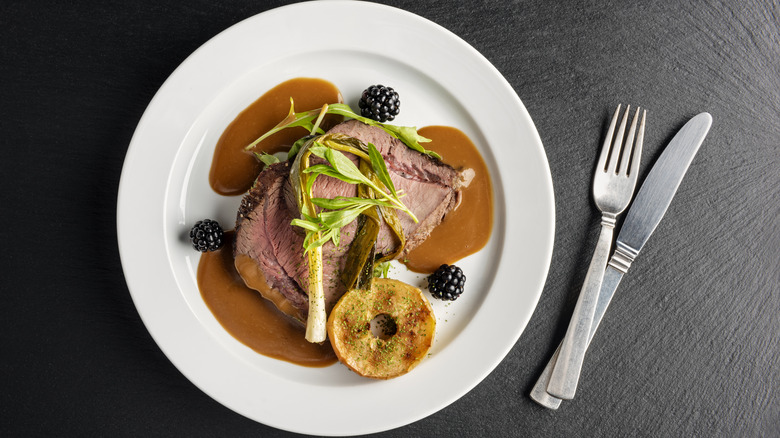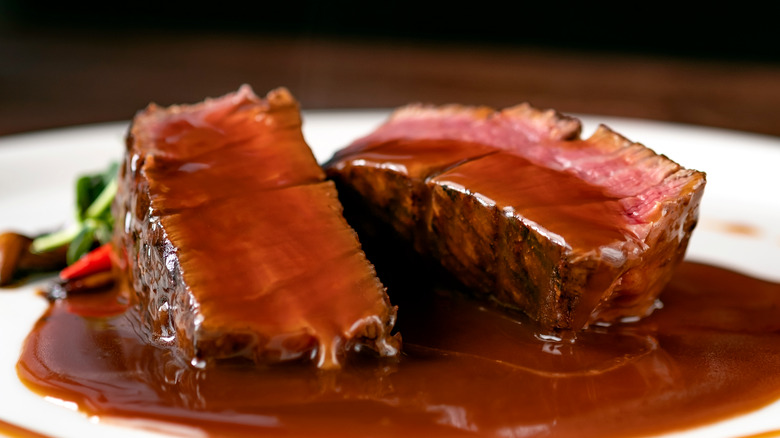What To Consider Before Choosing A Sauce For Your Meat
Sauce is a wonderful way to jazz up your dinner, bringing out the flavor in your protein in ways of which you otherwise could not dream. Sauces can also cover up all manner of sins, from overcooked meat to meat with textural issues due to freezing mishaps. A lot of the time, a good sauce is just as important (if not more) than the cook on your protein itself.
But you can't just pair any sauce with any meat, can you? Well, you theoretically could — no one is stopping you from doing the equivalent of putting peanut sauce on a vanilla ice cream cone — but that doesn't mean it'll taste good. Certain sauces pair much better with certain meats than others. Like wine pairings, it's all about picking flavors that complement each other rather than clash. Whether you're talking about poultry, pork, beef, or whatever other meats, there are some winning formulas and some options that won't work out quite as well.
Poultry, pork, and fish all have their favorites
Poultry like chicken or turkey is a bit sensitive compared to other meats; you don't want anything with too sharp of a bite that will overwhelm your bird. Lemon-based sauces are a great choice, so something like chicken scallopini is a classic. You can also go with a more light, wine-based sauce like marsala, although a demi glace (basically an espagnole reduced with veal stock) will probably be too much. Cream-based sauces can also work — that's the entire principle behind chicken alfredo — as can spicier pepper-based sauces.
Pork, meanwhile, is a little more sturdy; you can expose it to more things and have it work. Pork particularly benefits from acid – especially when it comes to vinegar — probably more than any other protein. Balsamic vinegar reductions are fantastic on pork in a way they wouldn't be on poultry. Any sort of mustard sauce is also a huge winner for pork, as is barbecue (there's a reason pork is usually Americans' go-to barbecue meat).
Fish is even more sensitive than poultry; fish flavors tend to be so delicate that your biggest worry is overpowering them entirely. Lemon-based sauces are good — fish and lemon is probably the classic combo — but they're not your only option. Anything butter-based is excellent, as are herb sauces, particularly mint-heavy ones. Pairing seafood with anything cheese-based is doable but tricky.
Steak is extremely versatile when it comes to sauce
Steak is a bit of an odd case because, honestly, most sauces will pair with steak. True, a good steak shouldn't necessarily need a sauce — but that doesn't mean it can't sometimes benefit from one. This includes more acidic, vinegar-based sauces like A.1. (there's a reason people call it steak sauce). Still, also creamy compound butter, herb-forward sauces like chimichurri, demi glaces, spicier sauces like horseradish, and even mayonnaise-based sauces like Yum Yum sauce. Steak has a prominent enough flavor to stand up to most sauces, and a versatile enough one that you can pair it with seemingly anything.
If you're working with steak, the sky is the limit here. If you're dealing with other types of proteins, though, maybe stick with what you know works; while there's certainly some room for creativity, if you go too far out there, you might fly just a little too close to the sun.


